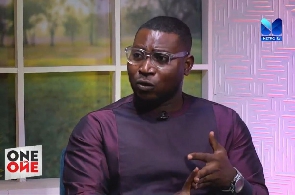Alliance for Social Equality and Public Accountability (ASEPA) has asked government to rescind its decision to purchase oil from the world market using gold.
Instead, it called on the government to put in place measures to strengthen the local currency that had depreciated against the US dollar by 50 per cent this year.
Mr Mensah Thompson, Executive Director of ASEPA, who made the call said barter trading gold for oil would deplete the country’s forest reserve.
He said this while addressing a news conference on the 2023 Budget Statement and Economic Policy of the Government, in Accra, on Monday.
The government last week disclosed that it intends to purchase oil from the world market using gold instead of the dollar due to the depreciation of the cedi against the US dollars.
Official data also shows that Ghana’s gross international reserves have fallen from $9.7 billion at the end of 2021 to around $6.6 billion at the end of September 2022.
Mr Thompson explained that gold was a commodity which had an extremely high price volatility on the world market and indicated that should the value of the commodity (gold) decline on the world market, government would require more gold to make the purchase.
“The sad situation about this is that Ghana has an oil refinery which has been abandoned since 2017.”
He added: “The volatility of gold prices set another stage for the fast depletion of the mineral resources the country has if the prices of the commodity fall.”
Mr Mensah Thompson also urged the government to revise the 2.5 per cent VAT rate as maintaining the current rate would worsen the already precarious economic situation of Ghanaians.
He said: “Inflation is currently at 40.4 per cent, Producer Price Index sits at 61.7 per cent, the 2.5 per cent increase in VAT would skyrocket prices even further in such a precarious situation which would fuel inflation to unprecedented levels."
“In response to the skyrocketed inflation in 2023, the Central Bank would automatically increase the Policy Rate to curb inflation, this would worsen cost of borrowing in 2023, people would not be able to borrow due to the high interest costs, those who would be able to borrow risk falling into a debt trap, NPL sitting on the books of banks would skyrocket leading this country into a recession.”
He also emphasised the need for the government to cut down on expenditure to avoid incurring more debt.
The government, among other things, froze recruitment, purchasing vehicles and printing calendars to cut down on its expenditure.
A few days ago, Vice President Mahamudu Bawumia said Ghana's intention to use gold to buy oil should not be misinterpreted as being against the use of the US dollar.
He said it is just a measure to help strengthen the cedi.
At the AGI Awards night in Accra, Dr Bawumia explained: "To address this fundamental challenge that we all face of depreciation and its impact on fuel and utility prices and food and so on, the government has opted to implement a policy of using our gold to buy oil products"
“If we implement it as we have envisioned, it will fundamentally change our balance of payment and significantly reduce the persistent deprecation of our currency,” he added.
“This has been misrepresented as Ghana being against the use of the US dollars in International transactions. This is not the case. We are not on any mission against the use of the dollars in international transactions, far from it. In fact, we want to accommodate all US dollars in our reserves. But we have a specific issue to deal with oil imports and the prices of fuel, food and transport and utilities that’s essentially what we are targeting,” Dr Bwumia notedhe.
The vice president recently announced the gold-for-oil via Facebook.
“As part of measures to operationalise the government’s use of gold to purchase oil products, the Minister of Lands and Natural Resources, Mr Samuel A. Jinapor has just issued the following directives”, wrote theh Vice President.
The directives include:
1. Effective 1 January 2023, all large-scale mining companies (as agreed with the Bank of Ghana) shall sell twenty per cent (20%) of all refined gold at their refineries to the Bank of Ghana (in Ghana cedis) before the export of the gold. The Bank of Ghana and the Precious Minerals Marketing Company (PMMC) will coordinate with the large-scale mining companies to ensure compliance with this directive.
2. Effective 1 January 2023, all Community Mining Schemes (CMS) shall sell their gold outputs to the government through PMMC. All mining licences for CMS shall include a clause mandating licencees to sell their gold output to the government.
3. Effective 1 January 2023, all licensed small-scale gold miners shall sell their gold to the government through PMMC. All small-scale gold mining licences shall include a clause mandating licencees to sell their gold to the government.
4. The gold to be purchased by the Bank of Ghana and the PMMC will be in cedis at a spot price with no discounts.
The directives, according to the Vice President, would also help local gold refineries obtain gold supplies from PMMC to support their operations, as they work toward obtaining the required London Bullion Market (LBMA) certification.
The cedi has, so far, lost 53.8% in value since the beginning of the year 2022, Finance Minister Ken Ofori-Atta told parliament when he read the 2023 budget on Thursday, 24 November 2022.
“The demand for foreign exchange to support our unbridled demand for imports undermines and weakens the value of the cedi", he told the house.
"This contributed to the depreciation of the cedi which has lost about 53.8% of its value since the beginning of this year, compared to the average 7% annual depreciation of the cedi between 2017 and 2021", Mr Ofori-Atta noted.
The minister also said external sector performance in the outlook will "depend largely on the quick resolution of the Russia–Ukraine war and the outcome of recession fears in advanced economies".
"The thrust of the external sector will focus on rebuilding external buffers enough to cover, at least, three-and-a-half months of imports of goods and services to cushion the economy against adverse external shocks".
"This will be underpinned by, among others, bilateral support, and strong remittance inflows", he noted.
The finance minister also revealed that Ghana’s debt stock shot up by GH¢93 billion this year as a result of the depreciation of the cedi.
“Mr. Speaker, provisional debt data as at the end of September 2022 shows a significant increase in Ghana’s public debt largely due to exogenous factors".
"The end–September 2022 provisional figures indicate that total gross public debt stood at GH¢467,371.31 million (US$48,871.34 million), representing approximately 75.9 percent of GDP.”
“The domestic debt component is GH¢195,657.60 million, which is 31.79 percent of GDP, whilst external debt is GH¢271,713.71 million, representing 44.15 percent of GDP". "The increase in the domestic debt is largely on account of rising interest costs".
"Domestic debt as a share of total public debt reduced from 51.6 percent in 2021 to 41.9 percent as at end of September 2022".
"Mr. Speaker, the external debt as a percentage of the total debt stock is 58.1 per cent as at end of September 2022".
"The sharp growth in the external debt stock is largely driven by the depreciation of the local currency". "The depreciation of the Ghana cedi added GH¢93,855.15 million to the external debt stock.”
Business News of Tuesday, 29 November 2022
Source: classfmonline.com













